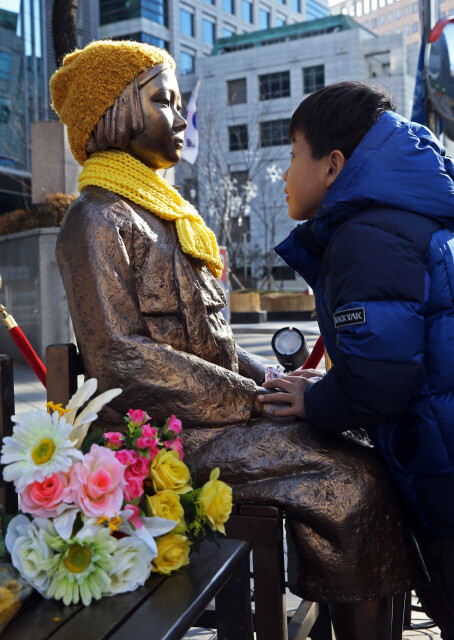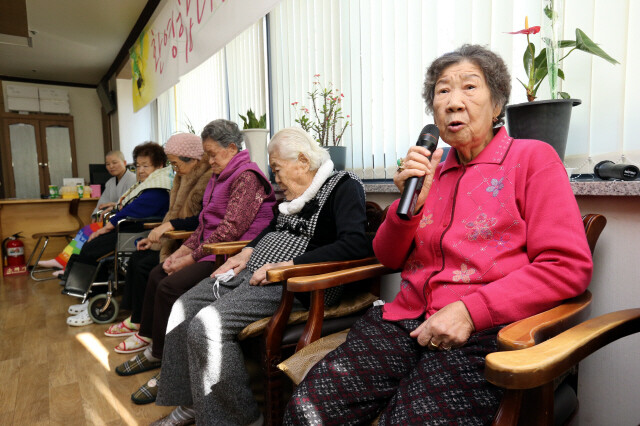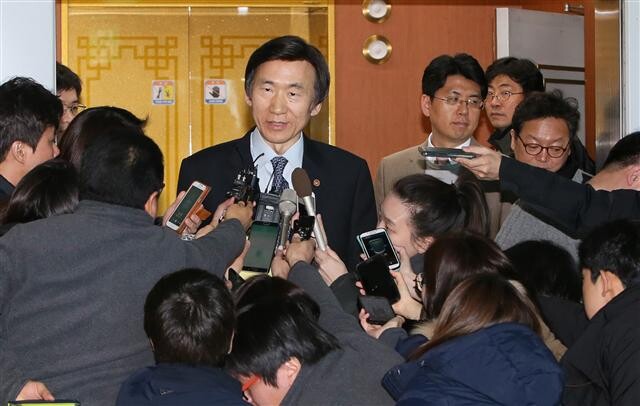hankyoreh
Links to other country sites 다른 나라 사이트 링크
[News Analysis] Korean, Japanese foreign ministers seek “creative solutions” to comfort women issue

The administrations of South Korean President Park Geun-hye and Japanese Prime Minister Shinzo Abe are reportedly in agreement about looking for “creative solutions” relying on diplomatic language for the issue of the comfort women, which includes acknowledging the legal responsibility of the Japanese government, restoring the reputations of the former comfort women, and providing those women with compensation. The issue of the comfort women, or women forced to provide sexual services for the soldiers of the Imperial Japanese Army, will be on the agenda when South Korean Minister of Foreign Affairs Yun Byung-se and Japanese Minister for Foreign Affairs Fumio Kishida meet in Seoul on Dec. 28.
The main components of the agreement are likely to be the creation of a fund to support the former comfort women, in which the Japanese government would invest 100 million yen (US$832,000), and a letter of apology, written by Japanese Prime Minister Shinzo Abe and personally delivered to the former comfort women by the Japanese ambassador to South Korea.
Since this does not begin to satisfy the demands made by the former comfort women and the Korean Council for the Women Drafted for Military Sexual Slavery by Japan (Jeongdaehyeop), there is expected to be a severe backlash from civic groups in South Korea.
After President Park called for accelerated talks to reach a breakthrough on the comfort women issue during her summit meeting with Abe on Nov. 2, deliberations on the issue - some public, and some behind closed doors - appear to have moved forward apace.
These efforts also led to the 12th round of bureau chief-level deliberations between South Korea and Japan on the issue, which were held in Seoul on Dec. 27 after Abe instructed Kishida to visit South Korea before the end of the year.
But rather than a final agreement, the meeting of foreign ministers on Dec. 28 is more likely to culminate in the announcement of a “creative solution” that will narrow the differences between the two sides on the key points under debate.
Generally speaking, there have been two issues that have dominated the two governments’ search for a diplomatic solution to the comfort women. The first issue is whether the Japanese government will acknowledge its legal responsibility. The second is what measures Japan will take to restore the reputation of the women and to ease their suffering. In addition, the two sides have reportedly been discussing what to do about Japanese demands to remove the statue of a young girl - symbolizing the comfort women - currently located in front of the Japanese embassy in Seoul.

The issue of the legal responsibility of the Japanese government can be subdivided into two more questions.
The first question is whether Japan violated international law when it set up and ran comfort stations during World War II. The international community has already made clear on a number of occasions that it holds the view that the Imperial Japanese Army’s comfort stations constituted a system of sexual slavery in wartime, which means it was in violation of international law. This view was expressed in a report by Radhika Coomaraswamy, former UN special rapporteur on violence against women.
But in previous discussions, the governments of South Korea and Japan have reportedly agreed to skirt this issue by not mentioning it. This approach would be sure to provoke controversy, since it disregards the demands made by the former comfort women and Jeongdaehyeop for the Japanese government to acknowledge the fact that the Imperial Japanese Army’s comfort women system was a violation of international law as well as a grave infringement of human rights and for the Japanese government to take responsibility for that crime.
The second question is whether the issue of the comfort women was resolved in the treaty under which Japan and South Korea normalized diplomatic relations in 1965. The Japanese government holds that all of its legal responsibility for the colonization of South Korea ended with the signing of the treaty, but the South Korean government does not agree.
The two countries have reportedly settled on the method of the Japanese government appropriating money from its budget to set up a fund to support the former comfort women, along with apologizing and expressing a keen sense of guilt, without taking legal responsibility. If the Park administration actually agrees to such an incomplete solution, the former comfort women are very likely to express their strong opposition.
“Considering what has transpired so far, the Blue House appears to have resolved to accept Japan’s suggestion. But if there is fierce pushback from the public, the Blue House could also reverse this,” said Lee Won-deog, director of the Institute of Japanese Studies at Kookmin University.

Another issue on which the two governments have also reportedly sought “creative solutions” wrapped in diplomatic rhetoric is the measures that the Japanese government will take to restore the reputation of the former comfort women and ease their suffering. The main provisions here are the creation of a fund with money allocated by the Japanese government and a letter of apology from Abe. While it remains to be seen how sincere the letter of apology will be and what language it will use, the attitude that the Japanese government has taken thus far suggests it is very unlikely that the former comfort women will be quick to accept these letters.
It is unlikely that the request of the Japanese government to remove the comfort women statue in front of the Japanese Embassy in Seoul will be included in the announcement of the results of the meeting between the two foreign ministers on Dec. 28. This is because, fundamentally, this is outside the authority of the South Korean government.
Reportedly, the Japanese government has asked for the statue to be relocated throughout the negotiations, while the South Korean government has responded that, if a solution is reached that satisfies the former comfort women and the public, the issue of the statue will be settled on its own. This hints at the possibility that, if the two sides reach an agreement, the South Korean government might take steps to “persuade” civic society to remove the statue.
However, removing the comfort women statue would inevitably be seen in South Korea as a humiliating concession. There is a considerable likelihood that this issue could become a last-minute obstacle to the negotiations between the two countries.
By Lee Je-hun, staff reporter

Editorial・opinion
![[Column] Park Geun-hye déjà vu in Yoon Suk-yeol [Column] Park Geun-hye déjà vu in Yoon Suk-yeol](https://flexible.img.hani.co.kr/flexible/normal/500/300/imgdb/original/2024/0424/651713945113788.jpg) [Column] Park Geun-hye déjà vu in Yoon Suk-yeol
[Column] Park Geun-hye déjà vu in Yoon Suk-yeol![[Editorial] New weight of N. Korea’s nuclear threats makes dialogue all the more urgent [Editorial] New weight of N. Korea’s nuclear threats makes dialogue all the more urgent](https://flexible.img.hani.co.kr/flexible/normal/500/300/imgdb/original/2024/0424/7317139454662664.jpg) [Editorial] New weight of N. Korea’s nuclear threats makes dialogue all the more urgent
[Editorial] New weight of N. Korea’s nuclear threats makes dialogue all the more urgent- [Guest essay] The real reason Korea’s new right wants to dub Rhee a founding father
- [Column] ‘Choson’: Is it time we start referring to N. Korea in its own terms?
- [Editorial] Japan’s rewriting of history with Korea has gone too far
- [Column] The president’s questionable capacity for dialogue
- [Column] Are chaebol firms just pizza pies for families to divvy up as they please?
- [Column] Has Korea, too, crossed the Rubicon on China?
- [Correspondent’s column] In Japan’s alliance with US, echoes of its past alliances with UK
- [Editorial] Does Yoon think the Korean public is wrong?
Most viewed articles
- 1[Column] Park Geun-hye déjà vu in Yoon Suk-yeol
- 2Thursday to mark start of resignations by senior doctors amid standoff with government
- 3N. Korean hackers breached 10 defense contractors in South for months, police say
- 4Kim Jong-un expressed ‘satisfaction’ with nuclear counterstrike drill directed at South
- 5[Editorial] New weight of N. Korea’s nuclear threats makes dialogue all the more urgent
- 6Will NewJeans end up collateral damage in internal feud at K-pop juggernaut Hybe?
- 7[Column] ‘Choson’: Is it time we start referring to N. Korea in its own terms?
- 8[Editorial] Japan’s rewriting of history with Korea has gone too far
- 9[Cine feature] A new shift in the Korean film investment and distribution market
- 10[Column] The president’s questionable capacity for dialogue